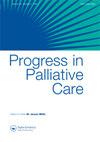日本老年肺炎死亡患者住院前居家医疗护理与住院积极治疗的关系
IF 0.9
Q4 PUBLIC, ENVIRONMENTAL & OCCUPATIONAL HEALTH
引用次数: 0
摘要
日本65岁及以上的老年人数量正在增加。急性护理医院的老年晚期患者接受积极的治疗,导致国家医疗成本上升;然而,报告表明,与患者讨论临终医疗可以减少不必要的积极治疗。这项研究调查了在住院期间死于肺炎的晚期老年患者中,家庭医疗的存在是否影响了积极治疗的使用。获得了2014年4月至2017年3月期间的日本诊断程序组合(DPC)患者数据。我们对65岁或65岁以上因肺炎住院并随后死亡的住院患者进行了一项多中心队列研究。我们使用卡方检验、t检验和逻辑回归分析分析了住院前、家庭医疗和肺炎晚期积极治疗之间的关系。提取的数据包括13582例65岁以上的肺炎患者。平均患者年龄为83.1(±7.02)岁,64.7%为男性,47.8%接受救护车运输,17.2%接受家庭医疗。33.3%的病例接受了积极治疗。2332例(17.2%;OR:0.879;95%CI:0.791-0.977)观察到自变量对攻击性治疗发生率的影响。接受救护车转运的患者的比值比更高,Barthel指数更高,a-DROP更高。我们发现,住院前接受家庭医疗护理的老年患者在肺炎晚期的积极治疗发生率显著降低。本文章由计算机程序翻译,如有差异,请以英文原文为准。
Relationship between pre-hospitalization home-based medical care of elderly patients who died from pneumonia and inpatient aggressive therapy in Japan
The number of elderly people aged 65 and over is increasing in Japan. Elderly, terminal patients in acute care hospitals receive aggressive therapy treatments, leading to higher national medical costs; however, reports indicate that patient discussions regarding end-of-life medical care can reduce unnecessary aggressive therapies. This study investigated whether the presence of home-based medical care impacted the use of aggressive therapies in terminal, elderly patients who had died of pneumonia during hospitalization. Japanese Diagnosis Procedure Combination (DPC) patient data were obtained for the period April 2014 to March 2017. We conducted a multicenter, cohort study of inpatients aged 65 years or older who were hospitalized for pneumonia and subsequently died. We analyzed the relationship between pre-hospitalization, home-based medical care, and aggressive therapies during the terminal stages of pneumonia using the chi-square test, t-tests, and logistic regression analyses. Data extracted included 13,582 cases of patients with pneumonia over the age of 65 years. The mean patient age was 83.1 (±7.02) years, 64.7% were male, 47.8% underwent ambulance transport, and 17.2% had home-based medical care. Aggressive therapy was administered in 33.3% of the cases. Effects of the independent variables on incidence of aggressive therapy were observed in 2,332 cases (17.2%; OR: 0.879; 95% CI: 0.791-0.977). Odds ratios were higher for patients undergoing ambulance transport, a higher Barthel index, and a higher A-DROP. We found that incidences of aggressive therapy during terminal stages of pneumonia were significantly lower for elderly patients who received home-based medical care prior to hospitalization.
求助全文
通过发布文献求助,成功后即可免费获取论文全文。
去求助
来源期刊

PROGRESS IN PALLIATIVE CARE
PUBLIC, ENVIRONMENTAL & OCCUPATIONAL HEALTH-
CiteScore
2.60
自引率
11.80%
发文量
24
期刊介绍:
Progress in Palliative Care is a peer reviewed, multidisciplinary journal with an international perspective. It provides a central point of reference for all members of the palliative care community: medical consultants, nurses, hospital support teams, home care teams, hospice directors and administrators, pain centre staff, social workers, chaplains, counsellors, information staff, paramedical staff and self-help groups. The emphasis of the journal is on the rapid exchange of information amongst those working in palliative care. Progress in Palliative Care embraces all aspects of the management of the problems of end-stage disease.
 求助内容:
求助内容: 应助结果提醒方式:
应助结果提醒方式:


